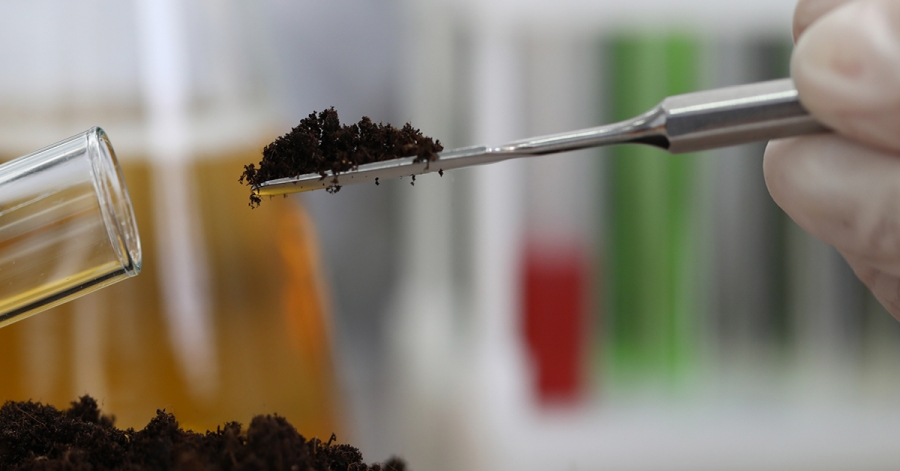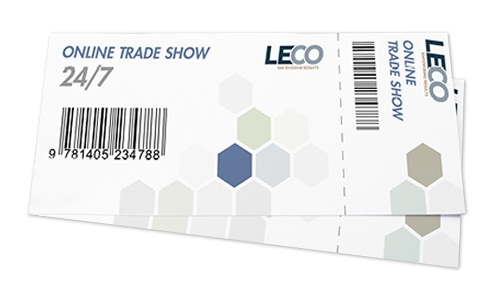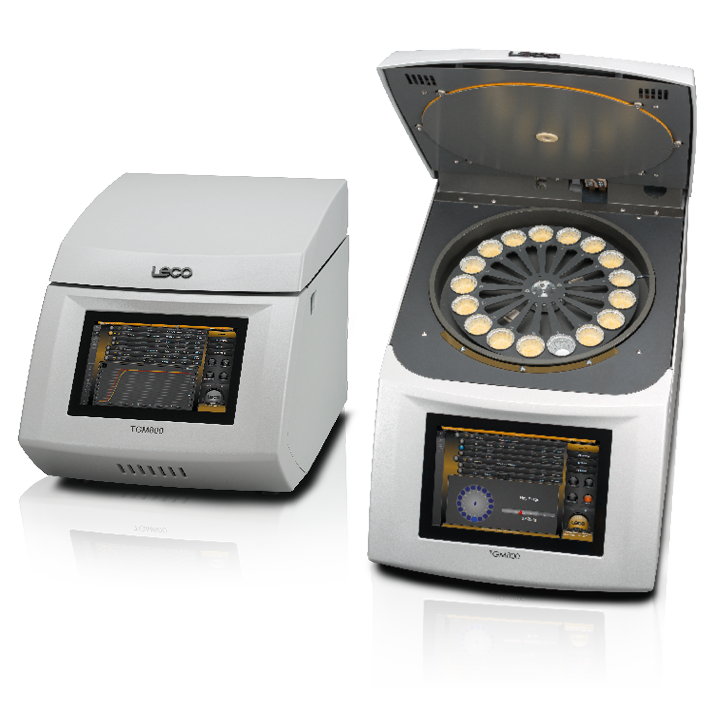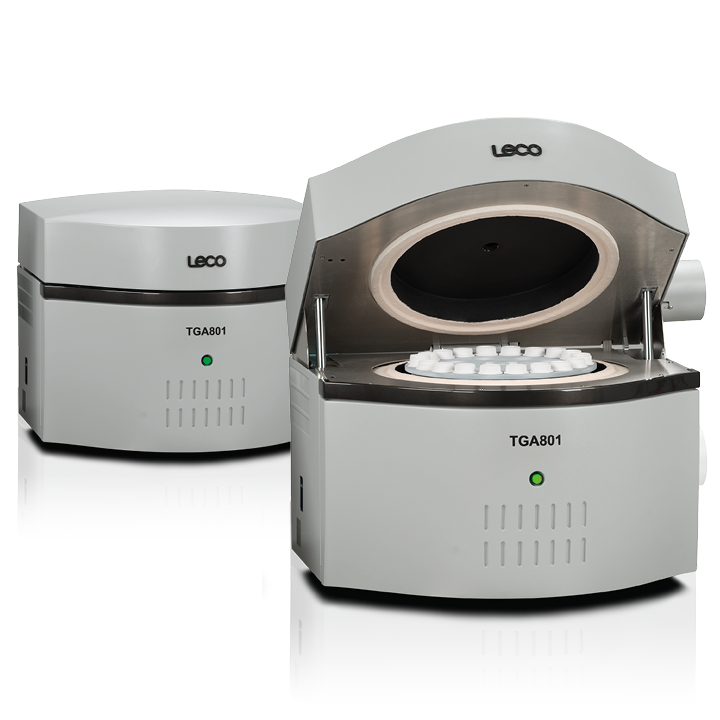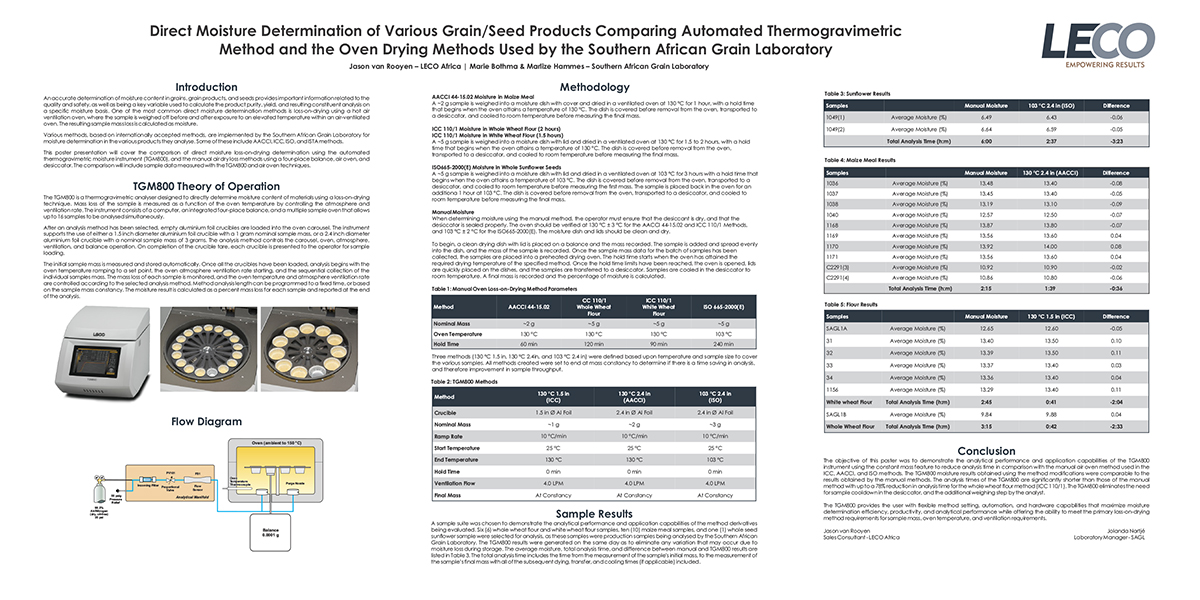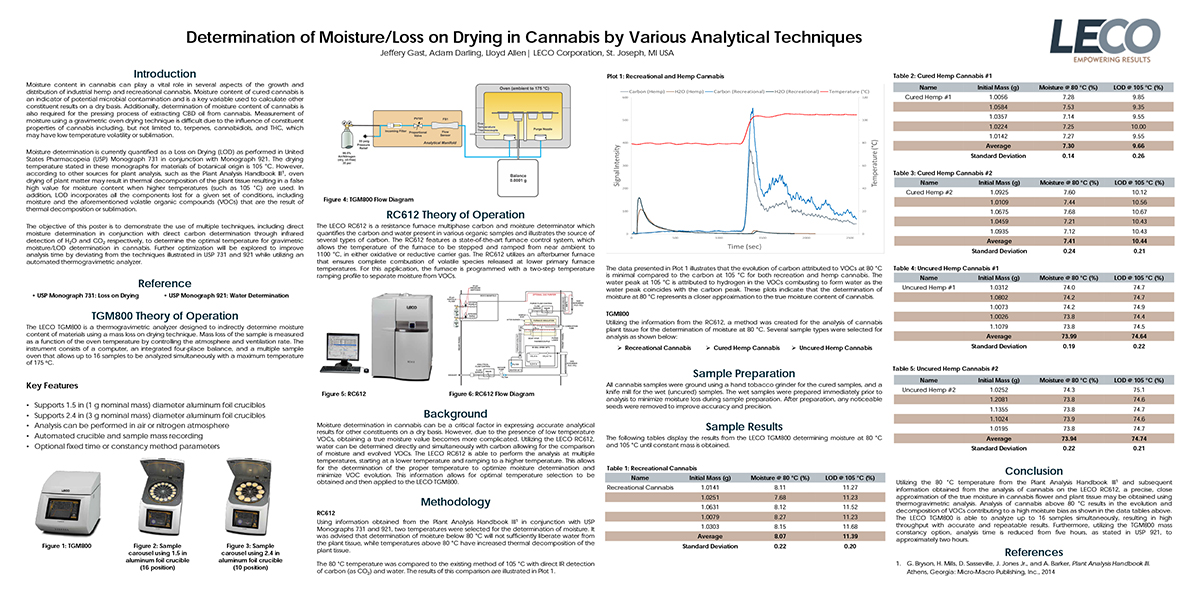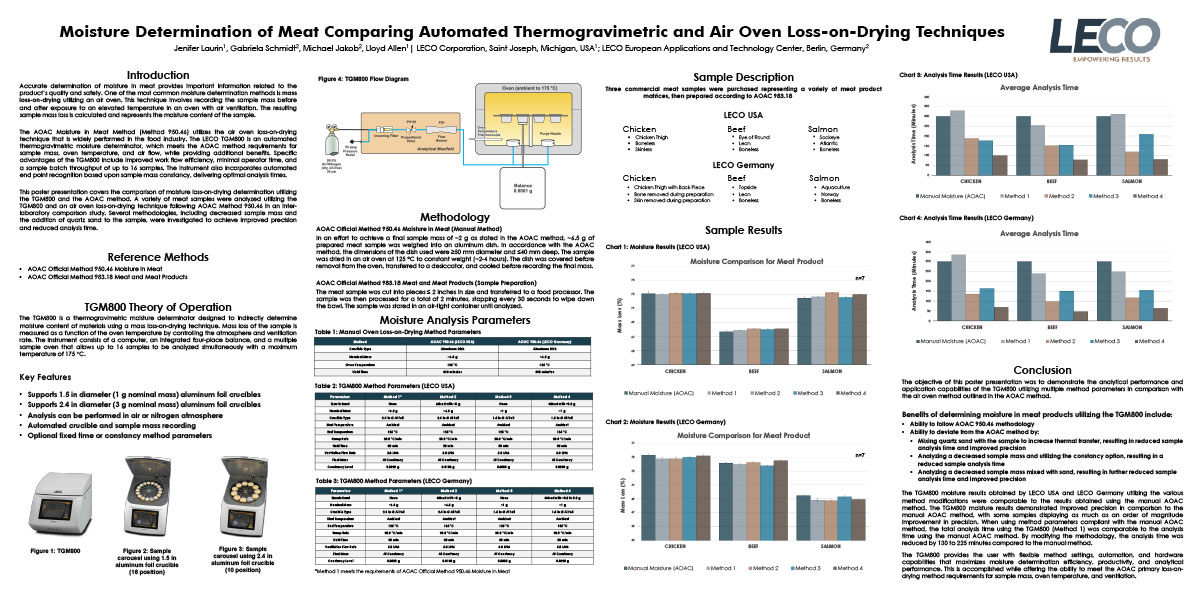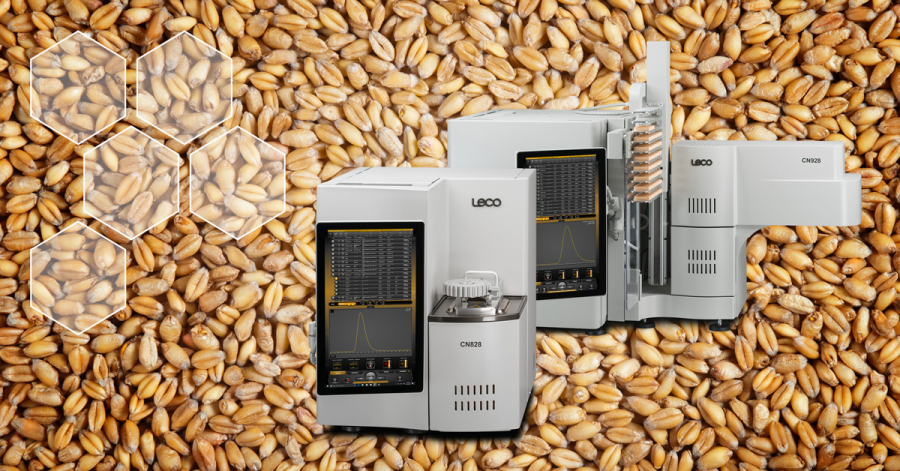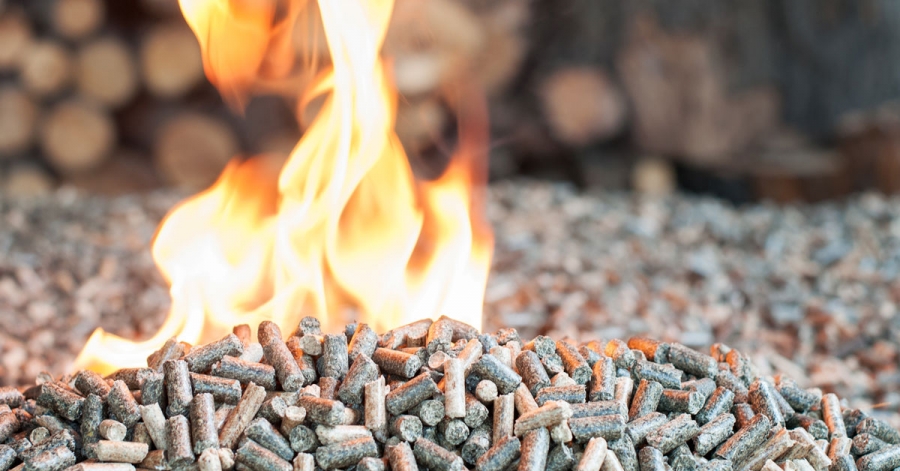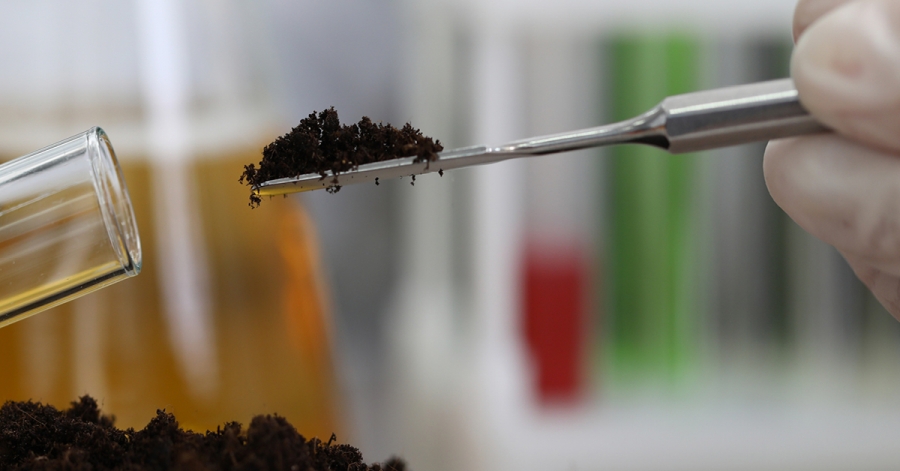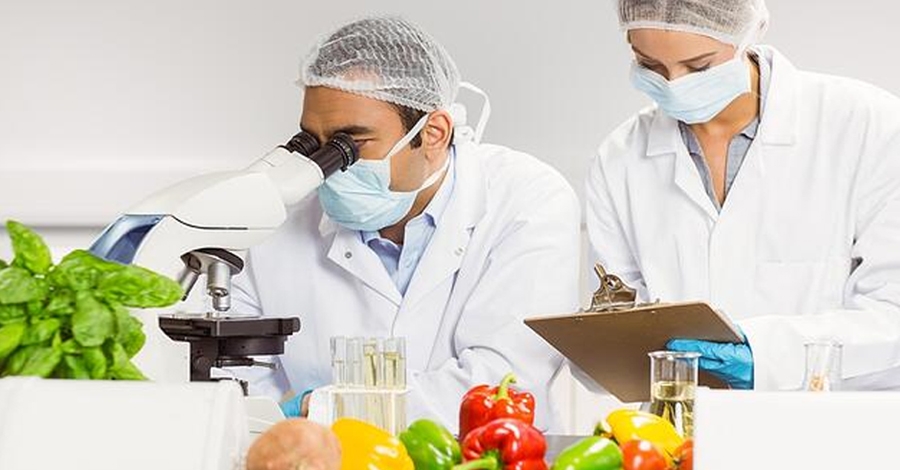
 LECO
Empowering Results
LECO
Empowering Results
Anzeigen der Artikel nach Schlagwörtern: Organisch
Soil is the material where corn grows. This sounds to be a simple sentence, but keep in mind, that a big part our food is directly or indirectly coming from plants that are sown, grown and harvested in agricultural soil. For modern agriculture especially when including environmental concerns, the chemical analysis delivers very important parameters for a complete characterisation of soil. LECO is the specialist for CNS and moisture/ash analysis in soil, as well as for Carbon species analysis like TOC/TIC or according to EN 17505 TOC400, ROC, ROC900 and TIC 900.
Your TOC analysis has never been easier with LECO’s solutions
Carbon is an essential building block of life on our planet. The amount of Carbon present is an important factor in soils and agriculture samples.
The determination of TOC in solids has recently become ever more important, not just for evaluating wastes but TOC content measurements are also an important aspect of assessing soils.
The Carbon present in soil organic matter is referred to as organic Carbon. Soil organic Carbon is a vital component of productive agriculture. In addition sequestration of Carbon in agricultural soils has been recognised as a tool to mitigate climate change.
LECO provides innovative and timesaving analytical instrumentation for the analysis of organic Carbon content.
Specific Advantages Including
- Market leading analytical performance
- Simplified sample preparation
- Robust & reliable instrumentation
- Unsurpassed instrument flexibility
- Adhering to all the current standards, such as ISO 10694, BS EN 17505 and EN 15936
Instrument Portfolio for TOC Analysis
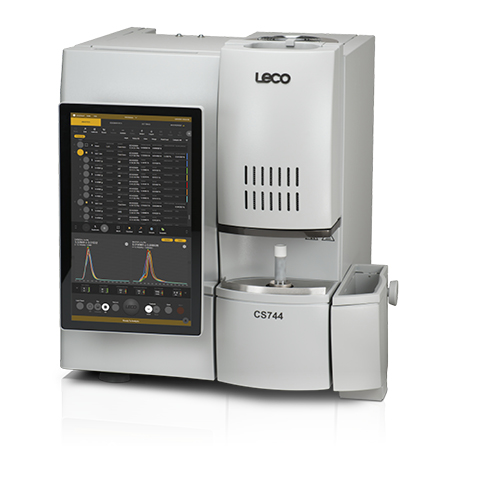
CS744 // Carbon analysis by combustion
Redefine the way you determine carbon in soils and plant tissues with our 744 series. Using extensive customer feedback and innovative engineering, the 744 takes advantage of our immersive CORNERSTONE® brand software platform and a number of features, ...
... such as an improved IR cell design and available automation, come together to increase usability, lab productivity, and lower your cost-per-analysis.

RC612 // Multi-Phase Carbon And Water Determination
Get fast, reliable carbon and water determination with our RC612. The RC612 is a resistance furnace multiphase carbon and moisture determinator which quantifies the carbon and moisture present in soils and plant tissues and illustrates the source of several types of carbon.
The RC612 features a state-of-the-art furnace control system, which allows the temperature of the furnace to be stepped and ramped from near ambient to 1,100 °C, in either oxidative or reductive carrier gas. The RC612 utilizes an afterburner furnace that ensures complete combustion of volatile species released at lower primary furnace temperatures.
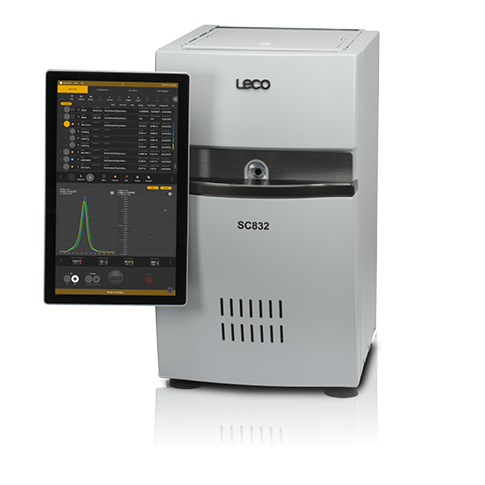
SC832 // Sulfur And Carbon Analysis
LECO’s 832 series of Elemental Determinators are specifically designed to perform carbon and sulfur analysis of soil, plant tissue and other organic and some inorganic materials. The 832 series is a valuable resource for any laboratory needing fast and accurate analysis.
Request SC832
Methods of TOC analysis include
1. Acid Digestion Method
The most common method for determining TOC is the acid digestion method. By acid treating a sample, usually with hydrochloric acid, which is strong enough to react with inorganic carbonates but does not react much with organic Carbon, the inorganic carbonate species within the sample will effervesce as Carbon dioxide. The acid-treated sample and a non-acid-treated sample can both be analyzed using either the LECO C744 series or LECO C832 series for Carbon content. The untreated sample would indicate the total carbon content, while the acid-treated sample’s Carbon content would be the remaining organic Carbon content. The difference between the two samples would be the total inorganic Carbon (TIC) content.
2. Temperature Dependent Method
Another Carbon determination method is temperature dependent. With the temperature dependent method, samples do not need to be pretreated. Organic Carbon combusts to CO2 between 150 °C and 450 °C, while inorganic species combust below 1,000 °C. The RC612 resistance furnace multiphase Carbon and moisture determinator performs this analysis by using a two-step temperature ramping at 450 °C and 1,000 °C without any acid pretreatment of the samples. The CO2 gases are swept through to an NDIR at 450 °C and again at 1,000 °C to determine the TOC and TIC in the sample.
For a more comprehensive exploration of these two methods, as well as an in-depth comparison of LECO instrumentation, please contact us:
On-demand Presentation // Watch the recorded Webinar
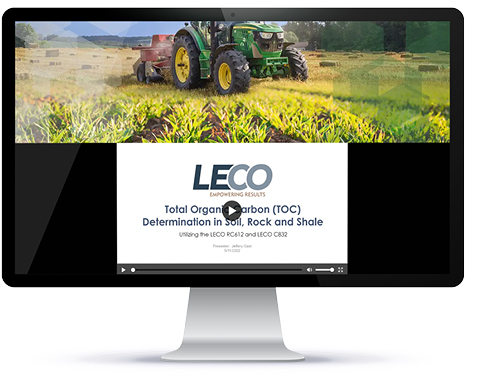
Bestimmung des organischen Gesamtkohlenstoffs (TOC) im Boden durch Säurebehandlung und Temperaturdifferenzierung
Presented by Jeffery Gast
The presentation will outline TOC determination in soil using two different approaches. First, we will explore the use of acid treatment of the soil to remove carbonates followed by analysis using conventional combustion techniques. Next, we will explore using a ramped furnace temperature approach to differentiate organic and inorganic carbon species. TOC results from both approaches will be presented.
Publication Library
Dive deeper into TOC analysis
Enhance your knowledge with our selection of publications. Discover techniques, comparisons, and applications in our downloadable resources, gaining valuable insights and enriching your understanding of Total Organic Carbon (TOC) analysis.
Click to download app note
- "Temperature-Dependent Determination of Total Organic Carbon (TOC) in Soil, Rock, and Shale" using RC612
- "Determination of Total Organic Carbon in Soil, Rock, and Shale by Acid Digestion and Combustion" using 832 Series
Click to download poster

If you want to learn more about our products and solutions for TOC analysis, book a free ticket to our Virtual Trade Show, or schedule an online demo for a deeper insight in our instruments.
Your TOC analysis has never been easier with LECO’s solutions
Carbon is an essential building block of life on our planet. The amount of Carbon present is an important factor in soils and agriculture samples.
The determination of TOC in solids has recently become ever more important, not just for evaluating wastes but TOC content measurements are also an important aspect of assessing soils.
The Carbon present in soil organic matter is referred to as organic Carbon. Soil organic Carbon is a vital component of productive agriculture. In addition sequestration of Carbon in agricultural soils has been recognised as a tool to mitigate climate change.
LECO provides innovative and timesaving analytical instrumentation for the analysis of organic Carbon content.
Specific Advantages Including
- Market leading analytical performance
- Simplified sample preparation
- Robust & reliable instrumentation
- Unsurpassed instrument flexibility
- Adhering to all the current standards, such as ISO 10694, BS EN 17505 and EN 15936
Instrument Portfolio for TOC Analysis

CS744 // Carbon analysis by combustion
Redefine the way you determine carbon in soils and plant tissues with our 744 series. Using extensive customer feedback and innovative engineering, the 744 takes advantage of our immersive CORNERSTONE® brand software platform and a number of features, ...
... such as an improved IR cell design and available automation, come together to increase usability, lab productivity, and lower your cost-per-analysis.

RC612 // Multi-Phase Carbon And Water Determination
Get fast, reliable carbon and water determination with our RC612. The RC612 is a resistance furnace multiphase carbon and moisture determinator which quantifies the carbon and moisture present in soils and plant tissues and illustrates the source of several types of carbon.
The RC612 features a state-of-the-art furnace control system, which allows the temperature of the furnace to be stepped and ramped from near ambient to 1,100 °C, in either oxidative or reductive carrier gas. The RC612 utilizes an afterburner furnace that ensures complete combustion of volatile species released at lower primary furnace temperatures.

SC832 // Sulfur And Carbon Analysis
LECO’s 832 series of Elemental Determinators are specifically designed to perform carbon and sulfur analysis of soil, plant tissue and other organic and some inorganic materials. The 832 series is a valuable resource for any laboratory needing fast and accurate analysis.
Request SC832
Methods of TOC analysis include
1. Acid Digestion Method
The most common method for determining TOC is the acid digestion method. By acid treating a sample, usually with hydrochloric acid, which is strong enough to react with inorganic carbonates but does not react much with organic Carbon, the inorganic carbonate species within the sample will effervesce as Carbon dioxide. The acid-treated sample and a non-acid-treated sample can both be analyzed using either the LECO C744 series or LECO C832 series for Carbon content. The untreated sample would indicate the total carbon content, while the acid-treated sample’s Carbon content would be the remaining organic Carbon content. The difference between the two samples would be the total inorganic Carbon (TIC) content.
2. Temperature Dependent Method
Another Carbon determination method is temperature dependent. With the temperature dependent method, samples do not need to be pretreated. Organic Carbon combusts to CO2 between 150 °C and 450 °C, while inorganic species combust below 1,000 °C. The RC612 resistance furnace multiphase Carbon and moisture determinator performs this analysis by using a two-step temperature ramping at 450 °C and 1,000 °C without any acid pretreatment of the samples. The CO2 gases are swept through to an NDIR at 450 °C and again at 1,000 °C to determine the TOC and TIC in the sample.
For a more comprehensive exploration of these two methods, as well as an in-depth comparison of LECO instrumentation, please contact us:
On-demand Presentation // Watch the recorded Webinar

Bestimmung des organischen Gesamtkohlenstoffs (TOC) im Boden durch Säurebehandlung und Temperaturdifferenzierung
Presented by Jeffery Gast
The presentation will outline TOC determination in soil using two different approaches. First, we will explore the use of acid treatment of the soil to remove carbonates followed by analysis using conventional combustion techniques. Next, we will explore using a ramped furnace temperature approach to differentiate organic and inorganic carbon species. TOC results from both approaches will be presented.
Publication Library
Dive deeper into TOC analysis
Enhance your knowledge with our selection of publications. Discover techniques, comparisons, and applications in our downloadable resources, enriching your understanding of Total Organic Carbon (TOC) analysis. Gain valuable insights by filling out our form to access the download files.
Download App Note
- "Temperature-Dependent Determination of Total Organic Carbon (TOC) in Soil, Rock, and Shale" using RC612
- "Determination of Total Organic Carbon in Soil, Rock, and Shale by Acid Digestion and Combustion" using 832 Series
Download Poster

If you want to learn more about our products and solutions for TOC analysis, book a free ticket to our Virtual Trade Show, or schedule an online demo for a deeper insight in our instruments.
LECO Solutions For Moisture/Ash Analysis
Automated moisture or moisture/ash determination with a primary loss on drying method for replacing the slow labor intensive, manual air oven method is ideal for most applications in the foods, feeds, and milling products industry. LECO‘s cutting-edge thermal gravimetric analysers, TGM800 and TGA801, are industry leaders in every field and run simultaneously for 10 up to 38 samples! Flexible Methodeneinstellung, Automatisierung und Hardwarefunktionen sorgen für maximale Produktivität in Ihrem Labor und ermöglichen einen vollautomatischen Analyseprozess, bei dem nur noch die ursprüngliche Probenmasse manuell ermittelt werden muss.
Specific Advantages Including
- Verbesserte Workflow-Effizienz.
- Minimale Bedienzeit.
- Maximized sample batch throughput
- Automatische Endpunkterkennung, basierend auf der Massenkonstanz der Probe.
- Optimale Analysezeit
- Stable and precise mass measurements
Instrument Portfolio Thermogravimetric Moisture Determinator
LECO bietet Geräte zur Bestimmung von Feuchte, Asche, flüchtigen Stoffen, Glühverlust und Brennwertbestimmung in verschiedenen organischen Materialien und hilft Energieunternehmen bei der Sicherstellung der Qualität.
Sample running with LECO TGA801 & TGM800
Simple entering of your samples into macro crucibles, easy and convenient, no need for touching the sample after starting the instrument.
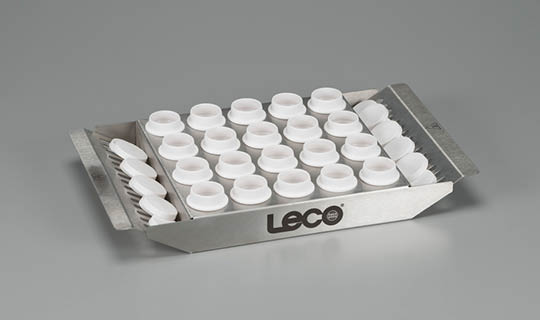
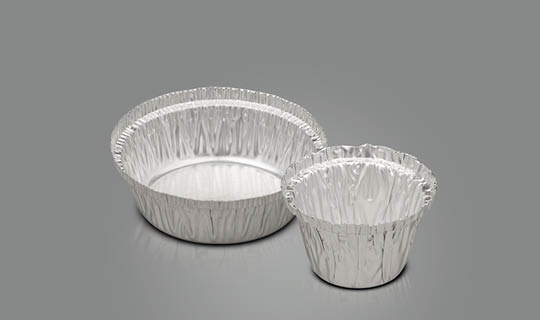


Moisture / Ash Determination App Notes Library
Learn more about our solutions for thermogravimetric moisture / ash analysis and read our Application Notes. In the following, you are going to find a content compendium according to moisture / ash determintation.
TGM800 Application Notes
Moisture / Ash Determination Scientific Poster
„Feuchte- und Gesamt-Feststoffbestimmung für Produkte auf Milchbasis – Vergleich von automatisierten thermogravimetrischen und Luftofen-Trockenverlusttechniken“
von Mason Marsh, Jenifer Laurin, Jeffery Gast (LECO Corporation, St. Joseph, MI USA)
Please click here to view the poster.
„Direkte Feuchtigkeitsbestimmung verschiedener Getreide-/Saatgutprodukte – Vergleich der automatisierten thermogravimetrischen und der Ofentrocknungsmethoden des Southern African Grain Laboratory“
von Jason van Rooyen (LECO Africa), Marie Bothma (Southern African Grain Laborator) und Marlize Hammes (Southern African Grain Laborator)
Please click here to view the poster.
„Bestimmung von Feuchtigkeit / Verlust beim Trocknen in Cannabis durch verschiedene Analysetechniken“
von Jeffery Gast, Adam Darling, Lloyd Allen (LECO Corporation, St. Joseph, MI USA)
Please click here to view the poster.
"Moisture Determination of Meat Comparing Automated Thermogravimetric and Air Oven Loss-on-Drying Techniques"
by Jenifer Laurin, Gabriela Schmidt (LECO Corporation, St. Joseph, MI USA), Michael Jakob, Lloyd Allen (LECO EATC, Berlin, Germany)
Please click here to view the poster.
Let LECO help you find the right instruments for your needs.
Wenn Sie mehr über unsere Produkte und Lösungen für die Feuchteanalyse erfahren möchten, buchen Sie ein kostenfreies Ticket für unsere virtuelle Messe oder verabreden Sie eine Online-Demo, um einen tieferen Einblick in unsere Geräte zu erhalten.
Die Analyse von Milchprodukten ist ein wichtiger Bestandteil des LECO-Produktportfolios für die Lebensmittelanalytik. LECO-Systeme kontrollieren die Qualität, Lebensmittelsicherheit und Nährwerte von Milch und Molkereiprodukten. Feuchte-/Asche-/Proteinbestimmung, präzise, schnell, exakt, in flüssigen und festen Matrizen. Rohmilch, Sahne, Quark, Milchpulver oder Käse – keine spezielle Probenbehandlungen und geringe Analysekosten.
Erfahren Sie mehr über unsere Lösungen für die Lebensmittelanalytik und lesen Sie unsere verschiedenen Publikationen …
Mit 85 Jahren Erfahrung in der Labortechnik wissen wir inzwischen ziemlich gut, dass es nicht nur darauf ankommt, hochwertige, spezialisierte Technik anzubieten, sondern ebenso zuverlässige Lösungen, wenn es um individuelle Anforderungen wie Service, Wartung, Support und Know-How geht.
Lernen Sie unseren professionellen LECO Kundenservice kennen! Wir bieten Ihnen ein breites Leistungsportfolio und helfen Ihnen dabei, die Produktivität und Effizienz Ihres Labors zu steigern.
Überzeugen Sie sich selbst - was können wir für Sie tun?
Die Dumas-Methode bietet gegenüber der Kjeldahl-Methode mehrere Vorteile: Sie ist viel schneller, bei viel niedrigeren Betriebskosten, hat keine echten Sicherheitsprobleme und erzeugt keinen Giftmüll. Es gibt jedoch eine Debatte darüber, welcher der beiden Hauptansätze für die Dumas-Methode besser ist: ein vertikaler oder ein horizontaler Verbrennungsofen. Um die Frage zu klären, welche Methode präziser ist und mehr Vorteile bietet, analysierten LECO-Chemiker viele Probentypen mit dem FP828 und dem FP928.
Für weitere Informationen und eine detaillierte Aufschlüsselung der Ergebnisse sowie einen Blick auf die Proben, die in diesem Experiment verwendet wurden, lesen Sie den Artikel von Michael Jakob in der September 2021 Ausgabe von eFOOD-Lab International.
LECO Solutions For Moisture/Ash Analysis
Automated moisture or moisture/ash determination with a primary loss on drying method for replacing the slow labor intensive, manual air oven method is ideal for most applications in the foods, feeds, and milling products industry. LECO‘s cutting-edge thermal gravimetric analysers, TGM800 and TGA801, are industry leaders in every field and run simultaneously for 10 up to 38 samples! Flexible Methodeneinstellung, Automatisierung und Hardwarefunktionen sorgen für maximale Produktivität in Ihrem Labor und ermöglichen einen vollautomatischen Analyseprozess, bei dem nur noch die ursprüngliche Probenmasse manuell ermittelt werden muss.
Specific Advantages Including
- Verbesserte Workflow-Effizienz.
- Minimale Bedienzeit.
- Maximized sample batch throughput
- Automatische Endpunkterkennung, basierend auf der Massenkonstanz der Probe.
- Optimale Analysezeit
- Stable and precise mass measurements
Instrument Portfolio Thermogravimetric Moisture Determinator
LECO bietet Geräte zur Bestimmung von Feuchte, Asche, flüchtigen Stoffen, Glühverlust und Brennwertbestimmung in verschiedenen organischen Materialien und hilft Energieunternehmen bei der Sicherstellung der Qualität.
Sample running with LECO TGA801 & TGM800
Simple entering of your samples into macro crucibles, easy and convenient, no need for touching the sample after starting the instrument.




Moisture / Ash Determination App Notes Library
Learn more about our solutions for thermogravimetric moisture / ash analysis and read our Application Notes. In the following, you are going to find a content compendium according to moisture / ash determintation. We kindly ask you to submit our form. Afterwards you‘ll get access to all the files.
TGM800 Application Notes
Please complete the form to get access to all App Notes.
TGA801 Application Notes
Please complete the form to get access to all App Notes.
Moisture / Ash Determination Scientific Poster
„Feuchte- und Gesamt-Feststoffbestimmung für Produkte auf Milchbasis – Vergleich von automatisierten thermogravimetrischen und Luftofen-Trockenverlusttechniken“
von Mason Marsh, Jenifer Laurin, Jeffery Gast (LECO Corporation, St. Joseph, MI USA)
Please complete the form to get access to all posters.
„Direkte Feuchtigkeitsbestimmung verschiedener Getreide-/Saatgutprodukte – Vergleich der automatisierten thermogravimetrischen und der Ofentrocknungsmethoden des Southern African Grain Laboratory“
von Jason van Rooyen (LECO Africa), Marie Bothma (Southern African Grain Laborator) und Marlize Hammes (Southern African Grain Laborator)
Please complete the form to get access to all posters.
„Bestimmung von Feuchtigkeit / Verlust beim Trocknen in Cannabis durch verschiedene Analysetechniken“
von Jeffery Gast, Adam Darling, Lloyd Allen (LECO Corporation, St. Joseph, MI USA)
Please complete the form to get access to all posters.
"Moisture Determination of Meat Comparing Automated Thermogravimetric and Air Oven Loss-on-Drying Techniques"
by Jenifer Laurin, Gabriela Schmidt (LECO Corporation, St. Joseph, MI USA), Michael Jakob, Lloyd Allen (LECO EATC, Berlin, Germany)
CPlease complete the form to get access to all posters.
Let LECO help you find the right instruments for your needs.
Wenn Sie mehr über unsere Produkte und Lösungen für die Feuchteanalyse erfahren möchten, buchen Sie ein kostenfreies Ticket für unsere virtuelle Messe oder verabreden Sie eine Online-Demo, um einen tieferen Einblick in unsere Geräte zu erhalten.
LECOs maßgeschneidertes Leasing – für jedes Budget mit Testphase!

TGM800 – Thermogravimetrisches Feuchte-Bestimmungsgerät.
Der TGM800 bietet eine hochpräzise, automatisierte Lösung zur Feuchtigkeitsbestimmung und ersetzt die langsame, mühsame, traditionelle Trocknungsverlusttechnik durch eine automatisierte Primärmethode. Das Design bietet eine Reihe zeitsparender Funktionen, z. B. die automatische Messung von bis zu 16 Proben gleichzeitig mit optionaler Erkennung des Trocknungszeitpunkts und eine intuitive Touchscreen-Software mit flexiblen Methodeneinstellungen.
Total sulfur value is an important characterisation measurement for coal, coke, fuel materials, and a wide variety of other organic materials. It is considered to be part of the ultimate analysis parameters (determination of carbon, hydrogen, nitrogen, sulfur, and ash with oxygen calculation by difference). The total sulfur value is a primary parameter used for assessing the quality of a fuel, calculating coal and coke preparation and cleaning processes, and the emissions potential of the fuel. The SC832 Series will bring productivity, precision, and progress to your lab when determining the sulfur and carbon content of your samples.
Visit our LECO VIRTUAL TRADE SHOW to learn more about our expertise in the fields of energy and fuels.
Soil is the material where corn grows. This sounds to be a simple sentence, but keep in mind, that a big part our food is directly or indirectly coming from plants that are sown, grown and harvested in agricultural soil. For modern agriculture especially when including environmental concerns, the chemical analysis delivers very important parameters for a complete characterisation of soil. LECO is the specialist for CNS and moisture/ash analysis in soil, as well as for Carbon species analysis like TOC/TIC or according to EN 17505 TOC400, ROC, ROC900 and TIC 900.
LECO hosted the LA2PC // Analytical Applications Poster Competition with the aim of improving our understanding and knowledge of LECO users’ work and research. This was a great opportunity to learn more from our users and introduce their work with LECO instruments to a wider base. LECO is proud that so many excellent posters were submitted. All entries are displayed in our poster gallery.
Wie effizient ist Ihr Workflow für Lebensmittelproben? Sind Sie sicher, dass Sie Substanzen in Ihrer Probe identifizieren können ? In dieser kostenlosen Webinar-Serie erfahren Sie, wie LECO die Analysen für mehr Lebensmittelsicherheit verbessert.
Unsere Webinare dauern etwa 30 Minuten und am Ende können Fragen gestellt werden. Registrieren Sie sich für die Themen, die Sie interessieren!
Gesunde Pflanzen brauchen einen ausgewogenen Boden. Während Kohlenstoff das wichtigste Element für das organische Leben ist, beeinflusst das Verhältnis von Stickstoff und Schwefel im Boden zusammen mit dem Kohlenstoff die Geschwindigkeit und Stärke der Pflanzenentwicklung und des Pflanzenwachstums. Mit einem Makroverbrennungs-Determinator für Kohlenstoff, Stickstoff und Schwefel wie dem LECO CNS928 können diese Verhältnisse leicht durch schnelle und präzise Analyse bestimmt werden.
Es gibt unzählige Düngemittel, die zur Veränderung des Verhältnisses der Elemente im Boden eingesetzt werden können. Ohne Kenntnis der Basiswerte Ihres Bodens haben Sie jedoch keine praktische Möglichkeit, zu wissen, was er benötigt. Mit dem CNS928 von LECO wird die Bodenbewirtschaftung fundierter.
Helium ist zwar nach wie vor das Inertgas der Wahl für die Elementaranalytik, aber das Angebot ist begrenzt, was die Kosten in die Höhe treibt. Das CNS928 wurde entwickelt, um die Verwendung von Helium oder Argon als Trägergas zu unterstützen. Der Unterschied in der Wärmeleitfähigkeit zwischen Argon und Stickstoff ist nicht so groß wie der Unterschied zwischen Helium und Stickstoff. Daher ist der Detektor bei Verwendung von Argon zur Stickstoffbestimmung von Natur aus weniger empfindlich. Der CNS928 bietet jedoch die Möglichkeit, auch größere Aliquotschleife als 10 cm3 zu verwenden. Die 10 cm3 Aliquotschleife hilft, die geringere Empfindlichkeit des Argon-Trägergases auszugleichen, indem das System für den niedrigsten Stickstoffbereich optimiert wird und höchste Präzision liefert.
Um mehr darüber zu erfahren, wie der CNS928 die Bestimmung von Kohlenstoff, Stickstoff und Schwefel mit verschiedenen Kombinationen von Trägergasen und Aliquotschleifengrößen handhabt, lesen Sie die Anwendungshinweise.
